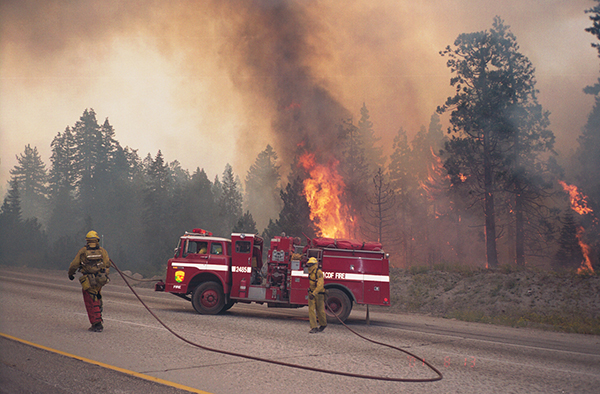 (Sacramento State/Rob Neep)
(Sacramento State/Rob Neep)Scientists, policymakers, community leaders, academics, and students will converge on Sacramento State for a groundbreaking conference on climate change that promises to produce lively debates, as well as potential solutions and policy changes.
Sac State’s College of Social Sciences and Interdisciplinary Studies (SSIS) is partnering with the Institute on Science for Global Policy (ISGP) to present “Water and Fire: Impacts of Climate Change” on Sunday, April 10, and Monday, April 11, at the University Union Ballroom.
The event is free and open to the public – and important to anyone concerned about drought, floods, wildfires, and declining fish populations in the Sacramento region, brought on by climate change. Attendees are expected to participate both days. Seating is limited. Register by April 4 for the two-day session, Day 1 dinner and Day 2 lunch: www.waterandfire2016.com, (530) 343-8181, or waterandfire2016info@gmail.com.
“Our vision is to get people talking and thinking about our priorities and assumptions about the impacts of climate in three key areas: water, fire, and fish,” says SSIS Dean Örn Bodvarsson. “We want to work toward a consensus about possible next steps in adapting to this critical situation. There’s a real desire in our community to discuss these issues in a proactive way, based on credible science.”
On Day 1, three experts on water, fire, and fish, who have written policy-position papers for the conference, each will defend their recommendations in 90-minute discussions with 40 invited debaters from academia, science, industry, advocacy, and policy. The experts and their topics are:
- Water: Roger Bales, director of the University of California’s Water Security and Sustainability Research Initiative – “Foundations for California’s Water Security in a Changing Climate.”
- Fire: Jon E. Keeley, research ecologist with the U.S. Geological Survey, based at Sequoia National Park – “The Future of California Wildfires: Sorting Out Global Change Impacts.”
- Fish: Christina Swanson, director of the Natural Resources Defense Council Science Center – “Sustainable Water Management by People and Fish, Now and in a Changing Climate.”
Frank Lake Kanawha, a research scientist with the U.S. Forest Service, will be the Day 1 dinner speaker. His subject is “The Role of Tribal Knowledge Systems in Collaborative Approaches for Addressing Climate, Fire, and Water Research and Management.” Music will be provided by the Excursions. Separate registration is required for the 5:40 p.m. reception and dinner, to be held at the Harper Alumni Center on campus.
On Day 2, the conference returns to the University Union Ballroom. The invited debaters and audience members will break into small-group caucuses and try to come to a consensus on actionable next steps. Their recommendations, along with summaries of the debates and the three policy papers, will be published in book form shortly after the conference ends.
Ken Pimlott, director of the California Department of Forestry and Fire Protection, will deliver the keynote address at lunch. Also planned is a screening of the 13-minute documentary The Fire Next Time, which explores the far-reaching effects of California’s devastating Rim Fire in 2013. In addition, Ryan Todd, Sacramento State’s sustainability manager, will talk about the University’s sustainability projects.
“Water and Fire: Impacts of Climate Change” runs from noon to 6:15 p.m. April 10, and 7:30 a.m. to 5:15 p.m. April 11.
To learn more about ISGP, go to scienceforglobalpolicy.org. – Dixie Reid
In the media:
